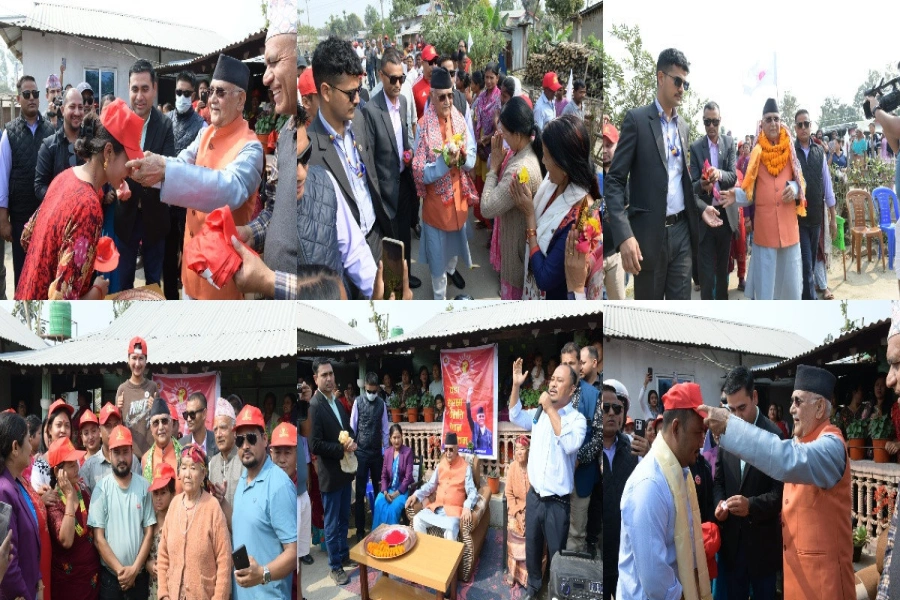“If chanting slogans don’t work, we will start with stones.” Dozens of angry and frustrated cine artistes, filmmakers and distributors chanted these slogans eight months ago in front of the building in Chabahil that hosted Film Development Board, the government body that looks after Nepali film industry.

They swarmed the streets to protest against the FDB which was then chaired by Ishwar Chandra Gyawali, a professor and political appointee by the Maoist party. Together they asked the Board and the government to stop promoting foreign films at the cost of Nepalis. Gyawali bid farewell to the board soon after, and was replaced by Ganesh Bhandari, the youngest ever candidate for the position.
A month later, filmmakers Yuvaraj Lama (Deuta) and K P Pathak (Maina) joined Bhandari taking into the confidence of all film artistes and technicians, promising to solve their problems and take the industry to newer heights.
The three resigned two weeks ago, on moral grounds, after the formation of new government that was followed by the resignation of Maoist supreme Pushpa Kamal Dahal “Prachanda” over the feud between the government and Nepal Army.
The FDB was incepted eight years ago to raise and solve the problems and plights of Nepali film industry and people involved with the industry, through legal means. It has, however, miserably failed to do anything drastic fantastic for Nepal’s puny and growing film market. Before the FDB, Royal Nepal Film Corporation (RNFC) used to look after everything associated with films that was formed by late King Mahendra during his Panchayat regime. The Corporation largely focused to be a Panchayat propaganda machine instead of developing the film industry in Nepal. From the time of Yadav Kharel, who was the first chair of the Board to Ishwar Chandra Gyawali, FDB often found itself weaved into the whirlwind of controversies and was never able to get rid of criticisms. The reasons were many: from promoting foreign cinema in Nepal to ruining Nepali movies’ market and many illegitimate decisions to favor certain party or filmmaker.
- Development tax waived for Nepali films
- Trend of releasing both Nepali and foreign films on the same day was removed
- FDB asked foreign filmmakers to submit them full script and documents verifying the Indian censorship criteria and the board made sure that foreign films are released under their recommendation
- Bollywood movie “Chandni Chowk to China” got banned from screening in the halls all over Nepal for carrying controversial message about the birthplace of Lord Buddha (the movie said he was born in India)
- It incepted a Trust Fund and allocated 10 million rupees to support ailing and sick film artistes when necessary
- One lakh rupees was to be provided to the kins of artists or technicians if they die during the film shoot
- It announced to provide 1,500 rupees as a monthly remuneration to senior actors Gopal Bhutani, Shanti Maskey and Jaynanda Chand Thakur
- The FDB did more press conferences than ever to make their “work process transparent to media and public”
- It proposed government to separate fifty million budgets for the overall development of the industry, formerly forty million was allocated every year
- It brought together all the theatres that screened Nepali films and ensured to assist them in the development of their physical infrastructure
- It formed a separate committee to promote indigenous filmmakers and films
Surprisingly, the past eight months at FDB saw no such controversy and the trio – Ganesh Bhandari, Yuvaraj Lama and KP Pathak remained clean, got support from film artistes and producers in what they wanted to achieve. Though their tenure was for two years, they resigned when the Maoists government fell since they were appointed by the ex-rebel’s
government.
The three new giants of FDB, adored and supported, had a lot of challenge from before they joined the board. “Initially, the choice of working for FDB was a big dilemma in itself,” said the former active member of the board and filmmaker Yuvaraj Lama. “But because (the then minister) Krishna Bahadur Mahara was determined to give the FDB a completely new direction, we decided to get in.”
Ironically, the main problem for the inactiveness of FDB is due to miscommunication, no-communcation and political strangling between the ministry and the board. The FDB is under Ministry of Information and Communications, instead of the Culture.
“We don’t blame Mahara. In fact, he was of great help. The bloody bureaucrats at the ministry were the villains. We had sent the ministry new regulations that could bring major changes to the Nepali film industry. And those corrupt bureaucrats hid our file and told us that they lost it. We heard that they completely changed it,” the three enjoined. “Needless to say they are the puppets and slaves of foreign mafias and they dance to the tunes of the Indian Embassy,” Yuvaraj Lama bluntly added.
Bhandari, Lama and Pathak had sent a proposal to be passed in this year’s budget declaration. Like always, their proposal got rejected by the government. They had proposed to allocate 50 million rupees of budget for FDB for one year and set development tax for foreign films at 29 per cent and 24 per cent for metropolis and elsewhere respectively. They also requested to regulate a 20 per cent tax in custom at border town and proposed for strict censorship for foreign movies.
But before their plan saw implementation, the three resigned. Immediately after their resignation, Lama and Pathak joined the tunes of Bhandari and became a member with the CPN-Maoist party alongside a hundred other cine artistes and technicians. When many believed that an artiste should remain apolitical and not affiliated to any ideology, the artists broke the trend and surprised many by joining hands with CPN-Maoists.
“It was late King Mahendra who said that artistes should maintain distance with politics,” Lama said. “Mahendra said so because for him we were nothing more than puppets for their recreation. He wanted to make us move with a remote control in his hand. Look at the cinema industry worldwide. You’ll find most cine actors either involved in social works, activism or as an active member of a political party,” Bhandari elaborated.
“We’re not like those political candidates who go door to door asking for votes. We’re now in a party to assure that there’s a policy formulated in favor of the Nepali film industry. We’ll die as cinema makers,” KP Pathak concurred.
As per the trio, the decision of joining CPN-Maoist was not taken abruptly and indecisively. They said it was because the Maoists were clear of what they wanted to achieve. “They were clear about the new Federal Democratic Nepal. They said no to bow down before the foreign masters and they had clear vision about transformation the society and brining in new regulations and policies,” said Lama.
“There’s no Great Wall of China between filmmakers and politicians. We’re no more ready to dance to any tunes played by the hooligans. There has been an ice-break and now we’re ready to take off in jet plane’s speed,” Bhandari added with metaphors.
 Yuvaraj Lama, Ganesh Bhandari & KP Pathak.
Yuvaraj Lama, Ganesh Bhandari & KP Pathak.Bijay Gajmer
Film Development Board grants permission to cinema halls to scr...

KP Pathak further revealed that some 150 more cine artistes are to join the Maoist party very soon. The new members at the FDB are “opportunists” and there is “hardly anyone who represents the Nepali film industry.” That is why there is “no hope and expectations from them,” according to him.
“We have already set a track to follow. And if the new appointees give a damn to the Nepali film fraternity, we will make sure that we come down to the streets, drag them by their collar and kick them out to Raxual in India, where they actually belong,” Lama blurted more aggressively.
In the meantime, many film hall proprietors repeat their right to get a chance to practice free trade in their screening business and that they must have the freedom to exercise the marketing of cinemas the way they wish.
Lama resists saying people in movie business do not understood the idea of free trade. “Free trade is for personal gains. When it’s about your country and your culture, you have to abide by rules and regulations of the nation state,” he said. Bhandari elaborated on Lama saying, “What is freedom? You have freedom to live. Does that mean you can go dance naked where people are singing hymns?”
The debate can go on. But, the three certainly tried to give a new direction to the FDB during their short tenure and quite successfully in some of their endeavors. What the new appointees are going to do is yet to see. Whether they will prove the three wrong or whether it will turn out to be just a “useless scarecrow board that does nothing,” as they put it.
And we leave that for time to uncover.




































